Mindfulness: A Powerful Tool for Sustainable Equine Practice

Jon Kabat-Zinn, PhD, founder of the Center for Mindfulness in Medicine, Health Care, and Society at the University of Massachusetts Medical School, describes mindfulness as paying attention, on purpose, to present moment thoughts, sensations, and surroundings without judgment. The opposite of mindfulness is a state of being on “autopilot,” where we miss what’s right in front of us. This state can cause excess feelings of stress, Caldwell explained.
Mindfulness is a skill we must learn to fully realize the benefits, and meditation is the most common tool used to learn this skill. With repeated practice, mindfulness leads to transformative self-awareness, Caldwell said. She stressed that mindfulness is often incorrectly associated with the image of a Buddha, an empty mind, or the absence of thought, but in fact it’s just learning to pay attention to what’s going on within and around us and accepting what is without judgment.
In Caldwell’s research project, she aimed to determine how practitioners are using mindfulness to support their careers. She interviewed 14 practicing equine veterinarians and discovered that mindfulness has been a key component to the sustainability of their health and careers.
Caldwell found that mindfulness appears to support the development of a “mindful toolbox” that promotes sustainable practice, which she divided into five components:
- Developing a professional identity
- Perspective taking
- Drawing and honoring boundaries
- Life and career resilience
- Improved personal and professional well-being
She discussed each of these individually.
A professional identity is the practitioner’s values, beliefs, strengths, and weaknesses. When professional identity was ill-defined, practitioners tended to seek external validation through their career success, self-blame when things went wrong, experience feelings of imposter syndrome, develop unrealistic expectations, feel a need to work all the time, worry about what others think, and engage in people-pleasing. But by practicing nonjudgmental awareness of self and self-compassion–skills learned through mindfulness–practitioners could respond to failures with kindness and accept mistakes without spiraling into self-blame. The result was transformative self-knowledge and internal validation, which reduced stress and allowed participants to find joy in their careers again.
Perspective taking was associated with improved patient care and improved well-being and is a positive protective factor against burnout. Mindfulness supports perspective-taking by teaching individuals to see the world nonjudgmentally. Removing judgment leaves room to see other points of view and helps bridge the gap between clinical expectations and reality. Caldwell explained that we judge people, especially clients, when they prevent us from getting the answer we want, they prevent us from doing the job we want to do, or they challenge our ego. Clients’ financial constraints, for example, can prevent veterinarians from achieving the clinical outcomes they desire, and feelings of compassion fatigue and burnout can result. When practitioners can let go of judgments and expectations for outcomes, they can improve their ability to have empathy and compassion, improve listening skills, improve decision-making, have fewer emotional reactions, and engage in collaborative problem-solving. Finding “an” answer versus “the” answer allows vets to find more success in their days regardless of the outcome, Caldwell said.
Boundary setting is acknowledging and prioritizing one’s needs, a skill learned through the transformative self-knowledge gained through mindfulness. Practitioners in Caldwell’s study benefited from having control over how they spent their time – limiting interactions with bad clients by learning to say no when necessary and feeling less guilt or fear over the consequences. This approach allowed for respectful and mutually beneficial client relationships. Furthermore, boundaries allowed for better work-life integration even when work and life were not fully balanced, as participants could be in the moment and maximize both aspects of their lives.
Caldwell’s study participants defined life and career resilience as believing the future to be good, despite in-the-moment circumstances, and having a renewed passion for life and practice. Mindfulness supports this by reminding us that difficult circumstances are temporary. Caldwell said four out of the 14 interviewees in her study reported having suicidal ideation, and all participants reported difficult times where they didn’t know how to move forward. Research has shown that mindfulness can curb suicidal ideation, and the study participants unanimously agreed that mindfulness allowed them to work through difficult times and remain in practice, finding a sustainable way forward.
Finally, Caldwell defined improved personal and professional well-being as “finding a better way to do life.” Mindfulness allowed practitioners the opportunity to relate to feelings of sadness, shame, depression, and anger in new ways, as well as gain understanding into what they needed to be personally successful and find joy in both work and life. All participants also reported at least one physical health benefit, such as reduced blood pressure, improved physicality, and the ability to ward off or heal injury.
Caldwell concluded that the Mindful Toolbox for Sustainability she identified in her study is helpful for equine vets to stay in practice. Mindfulness is well-researched, and its benefits are well-known. “It’s time to normalize the concept of mindfulness in veterinary medicine through open discussion and training,” she said.
Additional 2022 AAEP Wellness Coverage:

Written by:
Jennifer Selvig, DVM
Related Articles
Stay on top of the most recent Horse Health news with












